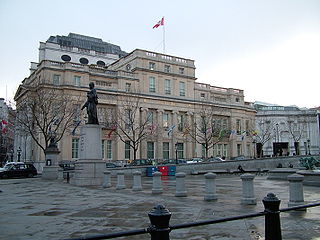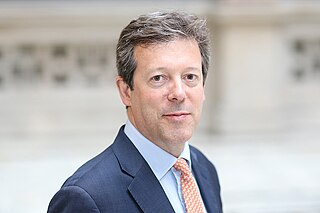Related Research Articles

Governor-general, or governor general, is the title of an office-holder. In the context of governors-general and former British colonies, governors-general are appointed as viceroy to represent the monarch of a personal union in any sovereign state over which the monarch does not normally reign in person. Governors-general have also previously been appointed in respect of major colonial states or other territories held by either a monarchy or republic, such as Japan in Korea and Taiwan and France in Indochina.
A commissioner is, in principle, a member of a commission or an individual who has been given a commission.
A resident minister, or resident for short, is a government official required to take up permanent residence in another country. A representative of his government, he officially has diplomatic functions which are often seen as a form of indirect rule.

The High Commission of Canada in the United Kingdom is the diplomatic mission of Canada to the United Kingdom. It is housed at Canada House on Trafalgar Square in central London.
Sir Robert Sidney Foster was a British colonial administrator, best remembered as the last colonial Governor of Fiji and the first Governor-General of the Dominion of Fiji. He had previously served as Governor of the Solomon Islands and as High Commissioner for the Western Pacific.

The Commissioner for the British Indian Ocean Territory is the head of government in the United Kingdom's overseas territory of the British Indian Ocean Territory. The Commissioner is appointed by the British monarch on the advice of the Foreign and Commonwealth Office. The Commissioner does not reside in the territory, as it has had no native population since the forced depopulation of the Chagossian people in the 1970s, and the only population is the military of the United States and the United Kingdom at the joint base at Diego Garcia.
Sir John Baines Johnston was a British diplomat. He is best known for being Britain's High Commissioner to Rhodesia when that colony made its Unilateral Declaration of Independence in November 1965.
James Nicholas Allan was a British diplomat, High Commissioner in Mauritius (1981–1985) and ambassador to Mozambique (1986–1989).

Sir Geofroy William Tory, was a British diplomat.

In the Commonwealth of Nations, a high commissioner is the senior diplomat, generally ranking as an ambassador, in charge of the diplomatic mission of one Commonwealth government to another. Instead of an embassy, the diplomatic mission is generally called a high commission.
The Nation is a newspaper based in Blantyre, Malawi, owned by Nations Publications Limited. It began distribution on 26 July 1993, and became a daily newspaper on 11 July 1994, coming out on Mondays through Fridays. Its sister newspaper, Saturday Nation, now called Weekend Nation, was launched in 1995.

Fergus Cochrane-Dyet is a British diplomat who served as High Commissioner to Zambia from April 2016 until August 2019, being succeeded by Nicholas Woolley. In 2011, while serving as High Commissioner to Malawi, he was declared persona non grata and expelled from the country because of controversial comments he made in a leaked diplomatic cable.
Sir Nigel Hugh Robert Allen Broomfield was a British diplomat.

Colin Roberts is a British diplomat and the former Governor of the Falkland Islands and former Commissioner of the South Georgia and the South Sandwich Islands.
John Tembo Jr is a Malawian diplomat. He is the Deputy High Commissioner from Malawi to the U.K. He worked at the foreign service in Japan, Belgium and England.

Lieutenant Colonel Sir Arthur John Dring was the second Prime Minister of the princely state of Bahawalpur. He was also the senior member of the Indian Political Service in the last decades of the British Raj, Assistant Private Secretary to the Governor-General of India and an advisor to governments on plebiscites for two former British colonies in Africa. Dring Stadium, the site of the second test cricket match of the India-Pakistan test series in 1955, is named after him. He was called John throughout his life.

Nigel Philip Casey is a British diplomat, who has been His Majesty's Ambassador to the Russian Federation since November 2023. He served as the British Ambassador to Bosnia and Herzegovina from September 2011 until 2013, and then as the British High Commissioner to South Africa from April 2017 until April 2021. From May 2021 to 2023, was concurrently the Foreign Office's Director for Afghanistan and as the Prime Minister's Special Representative for Afghanistan and Pakistan.
Sir David Lee Cole, KCMG, MC was a British diplomat. He was British High Commissioner to Malawi from 1964 to 1967 and British Ambassador to Thailand from 1973 to 1978.
References
- 1 2 3 4 5 6 7 "Wenban-Smith, (William) Nigel". Who's Who . Retrieved 31 October 2018.
- ↑ Baker, Colin (1999). "William Wenban-Smith". The Society of Malawi Journal. 52 (2): 78–80. JSTOR 29779040.
- ↑ Percival, John (2008). The 1961 Cameroon Plebiscite: Choice or Betrayal. African Books Collective. p. 8.
- ↑ "British Diplomats Directory: Part 2 of 4". Issuu. Retrieved 31 October 2018.